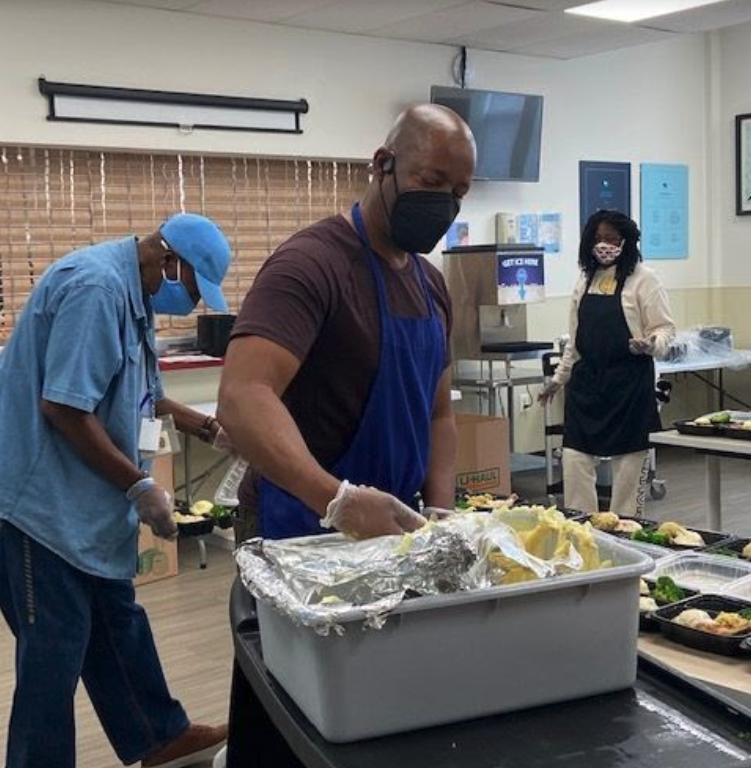How Episcopal Community Services helps families access nutritious food and healthful habits
 January 12, 2022
Category: Feature, Featured, Medium, Method
January 12, 2022
Category: Feature, Featured, Medium, Method
The pandemic upended jobs, housing and an entire economy.
Nationally food insecurity spiked, and Philadelphia has not escaped that impact. In 2021, nearly 29% of Philadelphians are estimated to have faced food insecurity, a rate that grew by a fifth from 2018, according to Feeding America. That is almost double the national average.
In response, Episcopal Community Services (ECS) and its partners have prioritized food accessibility with its expanded community cupboard and programming. One of the communities that ECS serves is Carroll Park, a neighborhood in West Philadelphia that the 151-year-old nonprofit has served for more than 20 years. Originally built as a shelter for families experiencing homelessness, its St. Barnabas Mission facility has transformed into a community center.
“Our outreach activities have fed families in the neighborhood for 10 years, where food insecurity is one concern that we hear about most,” says Rhena McClain, director of St. Barnabas Mission. “There has been a dramatic increase in the number of people seeking emergency food over the past several years—and the pandemic has only heightened the challenge of meeting their basic need of accessing food, let alone healthy food.”
When St. Barnabas operated as an emergency shelter, protecting the confidentiality and safety of its residents was a priority. “We’re now able to welcome more neighbors and become more engaged with the community,” she adds.
In recent years, the country’s primary standard of care for families experiencing homelessness has changed from a system of congregant shelters like St. Barnabas Mission to one of moving families directly into their own homes. Maintaining its commitment to provide safe housing, ECS tripled the number of units in its Rapid Re-Housing programs–now maintaining 60 stable homes for families experiencing homelessness.
Still, in Carroll Park, ECS collected feedback from the neighborhood through town hall-style meetings—in-person and virtual—to hear directly from the source what they said the area needed. Soft-launched in April 2021, Mission Meals + Market at St. Barnabas Mission provides the following initiatives, with plans for continued growth and additional programming.
Community Food Cupboard
ECS with Philabundance has extended its Community Food Cupboard hours and nearly doubled the number of families it supports. Previously, pre-packaged meal kits were provided, but now with open doors, neighbors select their own groceries, taking only what they want and need in an open-choice market, much like a grocery store. Filling the shelves are fresh fruit and vegetables, meats, non-perishable canned goods, health and hygiene items, and cleaning supplies. The open choice model not only creates a more respectful space but also reduces waste.
Nutrition Education + Workshops
All ECS health and wellness programming and classes have moved to St. Barnabas Mission. Neighbors who fill their fridges and pantries can also fill up on knowledge that supports healthy eating, cooking, and shopping. Classes include SNAP Education and Feed Your Potential 365 in partnership with the Health Promotion Council, Aramark, and the American Heart Association, respectively.
Community Cook-Off
An already-popular volunteer activity, Cook-Off is increasing its outcomes by offering more opportunities for volunteers to prepare meals for seniors experiencing food insecurity. Volunteers will gather weekly to assemble nearly 1,000 nutritious meals in the facility’s commercial kitchen. The cooking is done by chefs on staff, then plated and packaged by volunteers. ECS then delivers the meals to four local senior living centers.
Pamela Egleston, director of health and wellness programming, sees the countless opportunities to build a healthier community through more targeted outreach. Previously, ECS’ health education and workshops would be hosted at community centers for short-term cohorts.
“By having a constant presence, we hope to retain more families who will come back again and again for interactive workshops, connect with their neighbors, and maintain healthy habits–that, as we all know, are easy to break,” Egleston says. “And you can never learn too much.”
McClain, a West Philly native, sees how scarce healthy food options are in low-income communities, including this neighborhood she loves.
“I’ve been in West Philly my whole life. And I know the distance I drive from my home to St. Barnabas … you just don’t see a lot of places for food. You see convenience stores and corner stores, but not places to pick up the fresh foods you need to cook for your family,” she says.
And these communities are more likely to have to deal with more barriers already, like a lack of easy transportation, less money or irregular income to spend, and health conditions or home obligations making time-consuming, far-by-foot travel an obstacle.
“Simply put, quality food is out of reach by design in neighborhoods like this,” McClain adds, but with optimism to change that. “There’s the saying ‘give a man a fish and you feed him for a day; teach a man to fish and you feed him for a lifetime.’ But what happens when there aren’t any fish in the pond?”
Just as St. Barnabas was a beacon of hope for families experiencing homelessness, ECS’ goal is to make sure that this new use of the space will help it remain a hopeful one–one that continues to help families in this neighborhood and beyond.
—————-
In-kind donations are critical to the success of Mission Meals + Market, specifically the open-choice Community Food Cupboard. If you would like to help fill the shelves, please email sbm@ecsphilly.org or call 215.528.5407. Generous support from people like you makes all the difference.
Trending News












